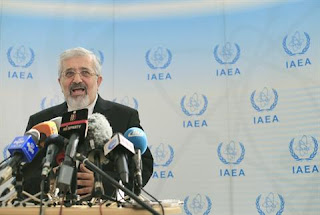For The Israel The United States, Canada and Australia Doing Everything They Can To Derail Any Chance Of A Diplomatic Solution With Iran
The U.S. ambassador to the United Nations nuclear watchdog stormed out of an agency meeting Wednesday in protest when Iran’s representative accused Israel of “genocide,” diplomats said.
Officials from Canada and Australia also left the closed-door meeting of the International Atomic Energy Agency’s 35-nation governing board when Iran’s Ali Asghar Soltanieh made his statement during a debate on Syria, they said.
Soltanieh was not immediately available for comment. Iran has often criticized Israeli policies toward the Palestinians. It has also said Israel would be wiped “off the face of the earth” if the Jewish state attacked it.
U.S. envoy Joseph Macmanus’ walkout highlighted tensions with Tehran a few hours after he accused the Islamic Republic of a “commitment to deception, defiance, and delay” in addressing IAEA concerns about possible nuclear weapons-related research.
The European Union also used the meeting to call on Iran to stop obstructing an IAEA investigation and give the agency access to sites and documents, regardless of broader talks between Iran and world powers that resumed last week.
Some diplomats say Iran is using its meetings with the IAEA merely for leverage in negotiations with world powers which, unlike the U.N. agency, have the power to ease sanctions that they have recently tightened on the major oil producer.
“Iran is inviting further isolation, pressure and censure from the international community ... until it meets its obligations and addresses the board’s concerns,” Macmanus said.
During the debate on Iran, Soltanieh said the allegations over his country’s nuclear work were “baseless” and suggested the IAEA, not Tehran, was to blame for the failure so far to revive the stalled inquiry.
Macmanus accused Iran of “provocative actions,” particularly the installation of advanced centrifuges that would enable it to speed up its uranium enrichment.
Western countries fear Iran is enriching uranium to develop the capacity to build nuclear weapons and have imposed several rounds of sanctions. Iran says the program is legitimate and intended for purely peaceful purposes.
Israel – widely assumed to have the Middle East’s only nuclear arsenal – says Tehran is secretly trying to develop nuclear weapons and has threatened pre-emptive strikes if it deems diplomacy ultimately futile.
Yukiya Amano, the 65-year-old Japanese diplomat appointed to a second four-year term as head of the IAEA Wednesday said he his aim was to help resolve the Iran nuclear issue through diplomatic means.
“For that I need cooperation from Iran,” he told reporters.
The Vienna-based IAEA has been trying for over a year to persuade Iran to give it the access it says it needs for its probe, so far without progress.
Iran has refused IAEA requests to visit the Parchin military site, where inspectors suspect explosives tests relevant for nuclear weapons development took place, possibly a decade ago.
Iran says it first needs to agree with the IAEA on how the inquiry is to be conducted before allowing any Parchin visit.
Former U.N. inspector Hans Blix warned warned world powers to avoid committing the same mistakes as Iraq by going to war against Iran based on fears it is developing nuclear weapons.
“It is true that diplomatic negotiations [with Iran] have dragged over the years with little results so far ... Some people assume that a war action will solve the problem,” Blix said.
“I think others should examine what is the merit of that and find that there is much more demerit,” he said, adding that “a war could develop into a terrible conflagration in the region.”
“If Iran has not made up its mind to make weapons of mass destruction before a war, I think they will come to that conclusion after a war,” said Blix, who wants international pressure on Iran to be eased.
“Threats can back up diplomacy but threats can also undermine diplomacy,” he said.
“Memories of the failure and tragic mistakes in Iraq are not taken sufficiently seriously,” he said.
Blix, former chief of the International Atomic Energy Agency, led the U.N. weapons inspection team in Iraq from March 2000 to June 2003, charged with finding the WMD that London and Washington were convinced former Iraqi dictator Saddam Hussein was concealing.
Following the 2003 invasion, the White House dispatched a team of 1,000 inspectors who failed to find any prohibited weapons in the country.

Iran won't give permission because it will leak back to the Israelis the location and the facilities will be bombed by IDF planes furnished by the United States tax dollars.
ReplyDelete